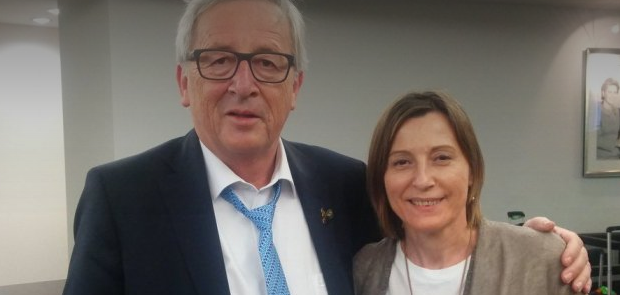[Llegiu-lo en català clicant aquí.]
This article from Sobirania i Justícia’s blog is based on my presentation at the conference The Future of Catalonia at The S. Abraham Center for International and Regional Studies, Tel Aviv University, Israel, on November, 14th 2017.
The future of Catalonia is bright. We are an open, peaceful society, with a highly developed and prosperous economy, a nation of deep democratic convictions and civic values. What we should worry about, and the European Union, too, is the future of Spain. It is embarking on an extremely dangerous drift towards authoritarianism with the potential of engulfing Europe in a major crisis.
Last November 2, when half of the illegally-deposed Catalan government was sent to jail, while the other half stayed in Brussels, thousands of people gathered in front of the Catalan Parliament shouting accusingly: “On és Europa!?” Where is Europe!?
The European Union does not wish Catalonia’s independence. For many reasons, not least the fear of Catalans not shouldering Spain’s enourmous public debt –over 100% of GDP. Let’s be realistic. Catalans will need to break free by exercising their democratic rights against Madrid’s opposition and that of Europe’s.
Yet the European Union is there for us. Even though Brussels is trying very hard to look away, to believe Madrid’s assurances that Catalonia will swiftly return to “legality” and “normality” (what a sad joke), Europe is there. Protecting Catalans of worse excesses by the Spanish fury thanks to its community of values, its standards of democracy and rule of law.
The European states’ club support to Spain is a fragile facade. The European Commission puts up with a considerable political cost, and suffers insistent questioning by journalists at the daily press conference at 12 noon. So far, the institutions indulge Spain’s scandalous ways because they think standing by Prime Minister Mariano Rajoy’s attempt to subdue Catalonia is in their best interest. If only he could stop that embarrassing state violence, the creeping Neofrancoist atmosphere… The president of the European Council, Mr. Donald Tusk, is a Pole who has direct experience of living under a dictatorship. When Catalonia declared independence on October 27, Tusk admonished Madrid on Twitter not to use the argument of force. To no avail.
Europe will find out sooner rather than later that Mariano is not the kind of man who fulfills promises –or expectations. In fact, European leaders should know better, he’s been around for years.
Rajoy will keep growing as a liability for his continental colleagues. The self-appointed champion of “legality” presides over the most corrupt political party in the EU, with almost 1,000 indicted officials. The “Gürtel” scandal includes deviation of European funds and amounts to hundreds of millions of Euros. Rajoy in person allegedly pocketed over €300,000 from illegal donations, which is rather modest considering that Luis Bárcenas, the party’s accountant at the time, piled up €38 million in a personal secret account in Switzerland. When Bárcenas was arrested, Rajoy sent him an sms message: “Luis, sé fuerte”. Luis, be strong. Luis is strong and free to pursue his hobby of skiing on the Pyrenées from his luxury villa at a chic resort.
Europeans should be advised not to take Spanish media at face value. The extent of Spanish fake news is a real problem for the defenders of the Catalan Republic. The central government controls public media directly, and exerts proven influence on highly-indebted media groups –which owe money to banks, which in turn got a “gift” rescue of over €40 bn in public money from… the Spanish government. In addition, many unionist media (even Barcelona-based) manipulate facts and figures daily in order to defend –you guessed it—the sacred unity of Spain. Unionists have a huge media megaphone and state power, whereas the newborn Republic has millions of people –and social media.
Now let me break some news to my fellow Europeans: Catalonia will neither abandon independence nor return to “normality” under Spanish occupation. Don’t be so naïve to kid yourselves, wishfully thinking of the most comfortable “solution”. Don’t be mentally lazy. Richard Youngs, a Carnegie fellow residing in Madrid, begged the European Comission not to sleepwalk through yet another crisis in the Catalan case. This is, refusing to acknowledge uncomfortable realities and doing too little, too late.
The reality is that the Madrid government, with the help of powerful actors such as political parties blinded by the sacred duty of defending the unity of Spain, and one of the least independent judicial systems in Europe, have violated Spanish, EU and UN legislation by, among other excesses:
a) violently chasing ballot boxes, expeditiously repressing other preparations of the independence referendum, and beating up peaceful voters on October 1st;
b) persecuting and imprisoning pro-independence Catalan elected officials and civic leaders for their ideas; and
c) usurping pro-independence Catalan institutions of government from its democratic incumbents.
The judicial cases against Catalan civil society leaders, government members and the members of the Bureau of the Catalan Parliament are so scandalous that the procedure may be nullified in Spain even before it reaches the European Court of Human Rights in Strasbourg. The Madrid-based National Court and Supreme Court are not even the due venue! Those indictments are outrageous, but, on top of it all, the officials’ prosecutions for rebellion and sedition naturally belong to Barcelona courts. Judicial authorities could only get away with this court handpicking by applying the Francoist Penal Code of 1974. And sure they did. A judicial backlash will eventually arrive, further damaging Spain’s reputation. Madrid is blinded by rage and wants revenge, even if it’s just buying time.
These supremely grave abuses are crowned by a fraudulent implementation of article 155 of the Spanish Constitution, by which the state, while unlawfully taking over Catalan institutions, has destroyed constitutional guarantees and other foundations of the democratic political system born in 1978. That system is over. A political tsunami is starting, one that will engulf Spain and may destabilize Europe. So far, a part from some scholars and a handful of small digital independent media in Madrid, only Catalans and Basques seem to have realized that the so-called State of Autonomies, by which the central government and regions divided competences in a democratic manner, has been dynamited.
Spain is entering unchartered territory, not because Catalonia wants out, but because Madrid is turning into an authoritarian regime in order to keep us in. So far, Brussels doesn’t see it or does not want to see that Spain is no longer a democracy.
Now back to the famous article 155. Rajoy was reluctant to use such a dangerous, double-edged weapon. The Catalan Parliament goes back to the 13th century, and the Catalan Government, known as Generalitat, to the 14th century. You treat a developed, proud nation as a colony at your own peril. On election day on December 21st, Rajoy most probably will get a message from voters, expressing the depth of their indignation at the takeover of our ancient state institutions.
Article 155 was the last resort to get rid of the Catalan government and the Parliament’s Speaker. The initial plan had been to have him suspended in his functions by the Constitutional Court. This was planned in 2015 through the Law for the Reform of the Constitutional Court. Like all repressive laws of the last years, it is allegedly general but in truth tailored for Catalonia. The reformed Constitutional Court acquired the right to suspend a public official for disobedience. Such competence, obviously, is unheard of in Western Europe, and the Venice Commission criticized it. Alas, when the propitious time came, the Constitutional Court hesitated to strip President Puigdemont of his office, in a procedure where he wouldn’t even have the right to be heard! Moreover, as an elected official, he was ‘aforado’, meaning that his judicial venue would have been the Catalan Supreme Court. The Constitutional magistrates in Madrid feared the belated but inevitable dressdown from Strasbourg and thus deprived Rajoy of a “clean” way to politically kill Puigdemont. Rajoy wouldn’t have had the problem of his running again now in December.
Catalonia is blazing the trail for many other sister nations which may try to break away from their state in their turn, and will wish to stay in the EU. It is not our fault that Scotland, the Basque Country, Flanders, Veneto, Brittany, South Tyrol and others may benefit from our liberation process. Yet sometimes in Brussels I have heard such consequence as an argument that diminishes our right to self-determination. It doesn’t.
Mr. Jean-Claude Juncker, president of the European Commission, recently said he did not support Catalan independence because he didn’t want a European Union of 98 states. Apart from the irony of such lecturing from a native of Luxemburg (500,000 inhabitants), the obvious answer is: Why not? Why not if this is what European citizens want? Commissioners always talk of a Europe of the citizens. Democratic institutions adapt to citizens’ needs and preferences, not the other way round.












